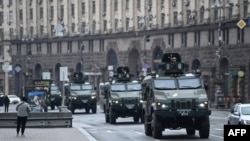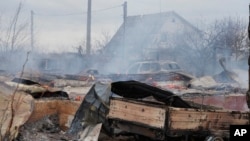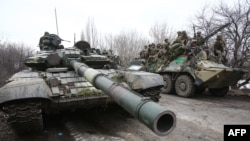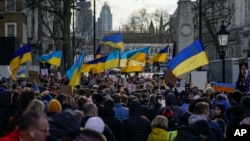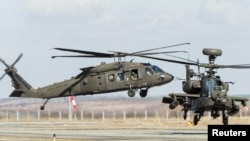Russia has "every intention" of overthrowing the Ukrainian government with Russian President Vladimir Putin's invasion of the neighboring country on Thursday, a U.S. official said.
"What we are seeing is initial phases of a large-scale invasion," a senior Pentagon official told reporters. "They're making a move on Kyiv."
WATCH: President Biden makes remarks on Russia's invasion of Ukraine:
"They have every intention of decapitating the Ukraine government," the official said.
The official said the first Russian assault involved more than 100 short-range ballistic missiles, but also medium-range ballistic missiles, cruise missiles and surface-to-air missiles. The missiles were targeted at military sites -- airfields, barracks and warehouses.
The United States has "seen indications" that Ukrainian troops "are resisting and fighting back," the official said.
Putin launched the invasion early Thursday in the biggest European onslaught since the end of World War II, attacking Ukrainian forces in the disputed eastern region and launching missiles on several key cities, including the capital, Kyiv.
Putin called it a "special military operation" aimed at the "demilitarization and denazification" of its southern neighbor, once a Soviet republic but an independent country since 1991.
In a predawn television address from the Kremlin, the Russian leader warned other countries not to intervene and said they would face "consequences they have never seen."
The United States and its Western allies quickly and uniformly condemned the invasion and vowed to announce punishing economic sanctions on the Russian economy later Thursday.
U.S. President Joe Biden called Putin's invasion a "premeditated war."
"Russia alone is responsible for the death and destruction this attack will bring, and the United States and its allies and partners will respond in a united and decisive way," Biden said in a statement shortly after the attack began. "The world will hold Russia accountable."
Biden met at the White House with his National Security Council to discuss the Russian attack and how the U.S. should respond.
Although Western leaders said they do not intend to send troops to Ukraine to fight the Russians, Biden was expected to announce the sanctions in a mid-day address after last-minute consultations with European leaders.
The U.S. and several allies had already imposed a first tranche of sanctions on Tuesday, a day after Putin declared the disputed eastern Ukrainian Luhansk and Donetsk regions as independent states and no longer part of Ukraine, much as he appropriated Ukraine's Crimean Peninsula in 2014.
But the initial sanctions, and the threat of tougher ones to follow, did not stop Putin from launching a full-blown war.
European Union foreign policy chief Josep Borrell called Russia's attack "amongst the darkest hours for Europe since the end of World War II." Speaking to reporters on Thursday, Borrell said Ukraine needs "urgent assistance" and that the EU would "respond in the strongest possible terms."
Ukrainian President Volodymyr Zelenskyy severed diplomatic ties with Moscow. He said Russian forces carried out strikes on Ukraine's military infrastructure and border guards. He said the government was introducing martial law throughout the country, while urging people to stay calm and stay home.
"No panic. We are strong. We are ready for everything. We will win over everybody because we are Ukraine," Zelenskyy said.
Zelenskyy said the government would arm "anyone who wants to defend the country."
Ukraine's military said Russia began shelling Ukrainian forces in the country's east Thursday morning and carried out rocket strikes at airports in multiple cities across Ukraine. A Zelenskyy aide told reporters at least 40 people have been killed.
In Kyiv, the downtown area became largely deserted. In residential districts, lines formed at banks and outside food stores. Main roads leading out of the city were clogged with traffic headed to the west.
From Slovyansk, Ukraine, VOA's Heather Murdock reported, "By 9 a.m. Thursday morning, families crowded onto long lines at ATM machines, supermarkets and fuel stations, stocking up in case the bombing begins again. Between 5 a.m. and 6 a.m., the crash of shells hitting the area could be heard from towns and cities as many as 50 kilometers from the border with Russia and Russian-backed separatists, as well cities far beyond, including the Ukrainian capital, Kyiv."
VOA's Jamie Dettmer reported from Kyiv that "the military airport of Hostomel west of Kyiv was struck early Thursday by attack helicopters, much deeper inside Ukraine than 20 kilometers."
Dettmer added, "According to former Deputy Prime Minister Ivanna Klympush-Tsintsadze, Russian military forces broke through into Ukraine in the Kyiv region at the Vilcha checkpoint. Border guards, together with the Ukrainian military, are now fighting to contain the breach. Additionally, Russian forces launched multiple rocket attacks on border guards at Mlachivka in the region of Zhytomyr, west of Kyiv.
Global sanctions
Biden said he discussed the situation in a phone call with Zelenskyy, who asked him to "call on the leaders of the world to speak out clearly against President Putin's flagrant aggression, and to stand with the people of Ukraine."
After speaking with G-7 leaders Thursday morning, Biden said the United States and other allies will impose severe sanctions on Russia.
European Union leaders were also preparing what EU foreign policy chief Borrell said would be "the harshest package of sanctions we have ever implemented."
British Prime Minister Boris Johnson tweeted that he also spoke with Zelenskyy about the impending actions and said Putin had opted for "a path of bloodshed and destruction."
For months, Russia has denied it planned to invade Ukraine, even as it massed 150,000 troops and military equipment, to the north in Russian ally Belarus, to the east in Russia along the Ukrainian border, and to the south of Ukraine in the Black Sea. The Kremlin accused Western governments of engaging in "hysteria" as they called for Russia to de-escalate the situation and often said Moscow's invasion could occur at any time.
Ukrainian Foreign Minister Dmytro Kuleba tweeted Thursday that the Russian leader had launched "a full-scale invasion of Ukraine."
He said the international community needs to respond with "devastating sanctions on Russia," as well as sending weapons, military equipment, financial assistance and humanitarian aid to Ukraine.
Peter Maurer, head of the International Committee of the Red Cross, urged all parties in the conflict to protect civilians.
"ICRC teams are responding to urgent humanitarian needs, and they must be able to continue their life-saving work," he said.
American troops have been setting up refugee stations inside Poland near its border with Ukraine for Ukrainians fleeing their homeland.
NATO response
NATO Secretary General Jens Stoltenberg called Russia's attack a "grave breach of international law."
"Once again, despite our repeated warnings and tireless efforts to engage in diplomacy, Russia has chosen the path of aggression against a sovereign and independent country," Stoltenberg said in a statement. "NATO Allies will meet to address the consequences of Russia's aggressive actions. We stand with the people of Ukraine at this terrible time. NATO will do all it takes to protect and defend all allies."
Ukraine is not a NATO member, although its constitution says that is its aim. Putin has demanded that the West disavow Ukraine membership in NATO, which the West has refused to do.
NATO leaders are due to meet Friday, and the alliance has activated its defense plans for member states in the region.
Lithuania, a NATO member, declared a state of emergency Thursday and ordered its army to deploy along its border with Belarus.
Putin's remarks came a short time after U.N. Secretary-General Antonio Guterres pleaded during an emergency meeting of the U.N. Security Council for Putin to avoid the conflict.
"Tonight, I have only one thing to say, from the bottom of my heart: President Putin, stop your troops from attacking Ukraine. Give peace a chance. Too many people have already died," Guterres said.
As word came during the meeting that Putin had deployed his forces against Ukraine, the secretary-general told reporters that he was changing his plea.
"I say, 'President Putin, in the name of humanity, bring your troops back to Russia. In the name of humanity do not allow to start in Europe what could be the worst war since the beginning of the century.'"
There is no purgatory for war criminals. They go straight to hell, ambassador.Ukraine UN Ambassador Sergiy Kyslytsya to Russian UN Envoy Vasily Nebenzya
Russia describes 'special operation'
Russia's U.N. ambassador, who also happens to be the president of the Security Council this month, presided over a meeting where his president's actions were denounced by nearly every member.
"We don't know all the details today, but briefly, I'd like to inform you that from his statement it says the occupation of Ukraine is not in our plans," Ambassador Vasily Nebenzya said. "The aim of the special operation is to protect the people who for eight-plus years have been suffering genocide from the Kyiv regime. And from this, we will demilitarize and degenocide Ukraine, and also hold accountable those who carried out so many crimes against civilians, including citizens of the Russian Federation."
Ukraine's envoy told the council it was too late to speak about de-escalation, as the Russian war had begun.
"There is no purgatory for war criminals. They go straight to hell, ambassador," Sergiy Kyslytsya told Nebenzya.
The Russian responded that Moscow is not attacking the Ukrainian people but "the junta that is in power in Kyiv."
Ukrainians democratically elected Zelenskyy to power in April 2019, in a landslide victory over former President Petro Poroshenko.
U.S. Ambassador Linda Thomas-Greenfield said the council needs to act, and they would put a draft resolution on the table Thursday.
A European diplomat said Security Council members are discussing a resolution that will make clear that Russia is not complying with the U.N. Charter, international law or Security Council Resolution 2202 — which endorsed the Minsk agreements — and it will urge Russia to immediately return to compliance.
Russia would be expected to veto such a measure, but a strong number of members voting for it would increase Moscow's isolation in the council. Diplomats would then likely move quickly to the General Assembly where it could be adopted without a threat of veto, but with no legal backing.
Multiple U.S. lawmakers condemned Russia's attack, including Senator Bob Menendez, chairman of the Senate Foreign Relations Committee, who said Putin's decision was driven by "fear of allowing a neighboring independent, sovereign nation to pursue democracy and freedom."
Senator Marco Rubio, a Republican Foreign Relations Committee member, said, "Ukraine is outgunned and outmanned. But they are brave and tough fighters. And as the world will soon learn, they have already inflicted damage on Russian invaders."
White House correspondent Anita Powell, VOA U.N. correspondent Margaret Besheer, Pentagon correspondent Carla Babb, State Department bureau chief Nike Ching, VOA refugee correspondent Heather Murdock in Slovyansk and Jamie Dettmer in Kyiv contributed to this report.
Some information came from The Associated Press, Agence France-Presse, and Reuters.




